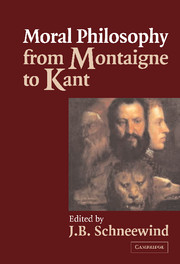Book contents
- Frontmatter
- Contents
- Preface
- Acknowledgments
- Foreword to the One-Volume Reprint
- Introduction
- PROLEGOMENA: SOME QUESTIONS RAISED
- PART I REWORKING NATURAL LAW
- Francisco Suarez
- Hugo Grotius
- Thomas Hobbes
- Richard Cumberland
- Samuel Pufendorf
- John Locke
- PART II INTELLECT AND MORALITY
- PART III EPICUREANS AND EGOISTS
- PART IV AUTONOMY AND RESPONSIBILITY
- Supplemental Bibliography
Richard Cumberland
Published online by Cambridge University Press: 05 June 2012
- Frontmatter
- Contents
- Preface
- Acknowledgments
- Foreword to the One-Volume Reprint
- Introduction
- PROLEGOMENA: SOME QUESTIONS RAISED
- PART I REWORKING NATURAL LAW
- Francisco Suarez
- Hugo Grotius
- Thomas Hobbes
- Richard Cumberland
- Samuel Pufendorf
- John Locke
- PART II INTELLECT AND MORALITY
- PART III EPICUREANS AND EGOISTS
- PART IV AUTONOMY AND RESPONSIBILITY
- Supplemental Bibliography
Summary
Introduction
Born in 1631 in London, Cumberland studied at Cambridge University and was elected a fellow of Magdalene College there in 1656. His career was in the Church of England, of which, after serving in several different parishes, he was made a bishop in 1691. He had been a loyal Protestant through the troubled years when Catholicism threatened England under James II. If the bishopric of Peterborough was a reward, it was one Cumberland had not sought, and he was diligent in carrying out the duties of his office. His only philosophical work was De legibus naturae (Treatise of the Laws of Nature), published in 1672 and translated into English twice during the eighteenth century and also into French, by Barbeyrac, the translator of Grotius and Pufendorf. Cumberland's other interest was history. He loved antiquarian research into Jewish history and wrote several volumes on various aspects of it, some published posthumously. He died in 1718.
The Treatise of the Laws of Nature is a rambling, badly organized work, in which Cumberland tried to replace Hobbes's views with an outlook that is at once philosophically defensible and substantively Christian. He spent many pages arguing against Hobbes – against his method, against his psychology, against the moral conclusions he drew, against his atheism, and against his politics. Cumberland tried to argue as rigorously as possible, drawing on science for assistance (there is a long section on human physiology, complete with a foldout diagram of the nerves in the backbone) but abstaining from the kind of humanistic citation of classical authors that Grotius used.
- Type
- Chapter
- Information
- Moral Philosophy from Montaigne to Kant , pp. 138 - 155Publisher: Cambridge University PressPrint publication year: 2002

